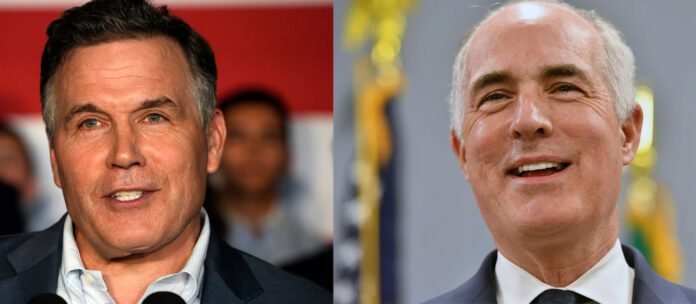
HARRISBURG, Pa. — Tuesday’s Pennsylvania primaries will cement the lineup for a high-stakes U.S. Senate race between Democratic Sen. Bob Casey and Republican challenger David McCormick, a contest that is expected to cost hundreds of millions of dollars and could help decide control of the Senate next year.
Casey, seeking his fourth term, is perhaps Pennsylvania’s best-known politician and a stalwart of the presidential swing state’s Democratic Party — the son of a former two-term governor and Pennsylvania’s longest-ever serving Democrat in the Senate.
McCormick is a two-time Senate challenger, a former hedge fund CEO and Pennsylvania native who spent $14 million of his own money only to lose narrowly to celebrity heart surgeon Dr. Mehmet Oz in 2022’s seven-way GOP primary. Oz then lost to Democratic Sen. John Fetterman in a pivotal Senate contest.
This time around, McCormick has consolidated the party around his candidacy and is backed by a super PAC that’s already reported raising more than $20 million, much of it from securities-trading billionaires.
McCormick’s candidacy is shaping up as the strongest challenge to Casey in his three reelection bids. McCormick, intent on shoring up support in the GOP base, told an audience of conservatives in suburban Harrisburg earlier this month that he tells people “you’re going to agree with about 80% of what I say … but we disagree 90% of the time with the crazy progressive left that’s destroying our country.”
The Senate candidates will share a ticket with candidates for president in a state that is critical to whether Democrats can maintain control of the White House and the Senate. President Joe Biden and former President Donald Trump are expected to win their party nominations easily now that all major rivals have dropped out.
Of note, however, could be the number of “ uncommitted ” write-in votes cast in the Democratic primary to protest Biden’s handling of the Israel-Hamas war.
In the Senate contest, Democrats have attacked McCormick’s opposition to abortion rights, his frequent trips to Connecticut’s ritzy “Gold Coast ” where he keeps a family home, and the focus on investing in China during his dozen years as an executive at the hedge fund Bridgewater Associates, including as CEO.
Casey has been a key player for Democrats trying to reframe the election-year narrative about the economy by attacking “greedflation” — a blunt term for corporations that jack up prices and rip off shoppers to maximize profits — as fast-rising prices over the past three years have opened a big soft spot in 2024 for Democrats. Recent indications that the U.S. economy avoided a recession amid efforts to manage inflation have yet to translate into voter enthusiasm for giving Biden a second term.
McCormick, meanwhile, has accused Casey of rubber-stamping harmful immigration, economic, energy and national security policies of Biden, and made a bid for Jewish voters by traveling to the Israel-Gaza border and arguing that Biden hasn’t backed Israel strongly enough in the Israel-Hamas war.
Casey is one of Biden’s strongest allies in Congress.
The two men share a hometown of Scranton and their political stories are intertwined. Biden — who represented neighboring Delaware in the Senate and roots for Philadelphia sports teams — has effectively made Pennsylvania his political home as a presidential candidate. Long before that, Biden was nicknamed “Pennsylvania’s third senator” by Democrats because he campaigned there so often.
McCormick and Trump have endorsed each other, but are an awkward duo atop the GOP’s ticket. Trump savaged McCormick in 2022’s primary in a successful bid to lift Oz to his primary win. And McCormick, for his part, has told of a private meeting in which he refused Trump’s urging to say that the 2020 presidential election was stolen, a disproven claim the former president has never abandoned.
Democrats currently hold a Senate majority by the narrowest of margins, but face a difficult 2024 Senate map that requires them to defend incumbents in the red states of Montana and Ohio and fight for open seats with new candidates in Michigan and West Virginia.
A Casey loss could guarantee Republican control of the Senate.
Elsewhere on the ballot Tuesday, Pennsylvanians will decide nominees for an open attorney general’s office and two other statewide offices — treasurer and auditor general — plus all 17 of the state’s U.S. House seats and 228 of the state’s 253 legislative seats.
For attorney general, Republicans have a two-way race while Democrats have a five-person primary field. Democrats also will decide on challengers to incumbent Republican state Treasurer Stacy Garrity and state Auditor General Tim DeFoor.
For Congress, 44 candidates are on ballots, including all 17 incumbents, just three of whom are facing primary challengers: Democratic Reps. Summer Lee in a Pittsburgh-based district and Dwight Evans in Philadelphia and Republican Rep. Brian Fitzpatrick in suburban Philadelphia.
Lee’s primary against challenger Bhavini Patel has shaped up as an early test of whether Israel’s war with Gaza poses political threats to progressive Democrats in Congress who have criticized how it has been handled.
Voters will decide from among three would-be Republican challengers to Democratic Rep. Susan Wild, whose Allentown-based district is politically divided, and six Democratic candidates hoping to challenge Republican Rep. Scott Perry of southern Pennsylvania.
Perry has become a national figure for heading up the ultra-right House Freedom Caucus during a speakership battle and his efforts to help Trump stay in power after losing 2020’s presidential election.






